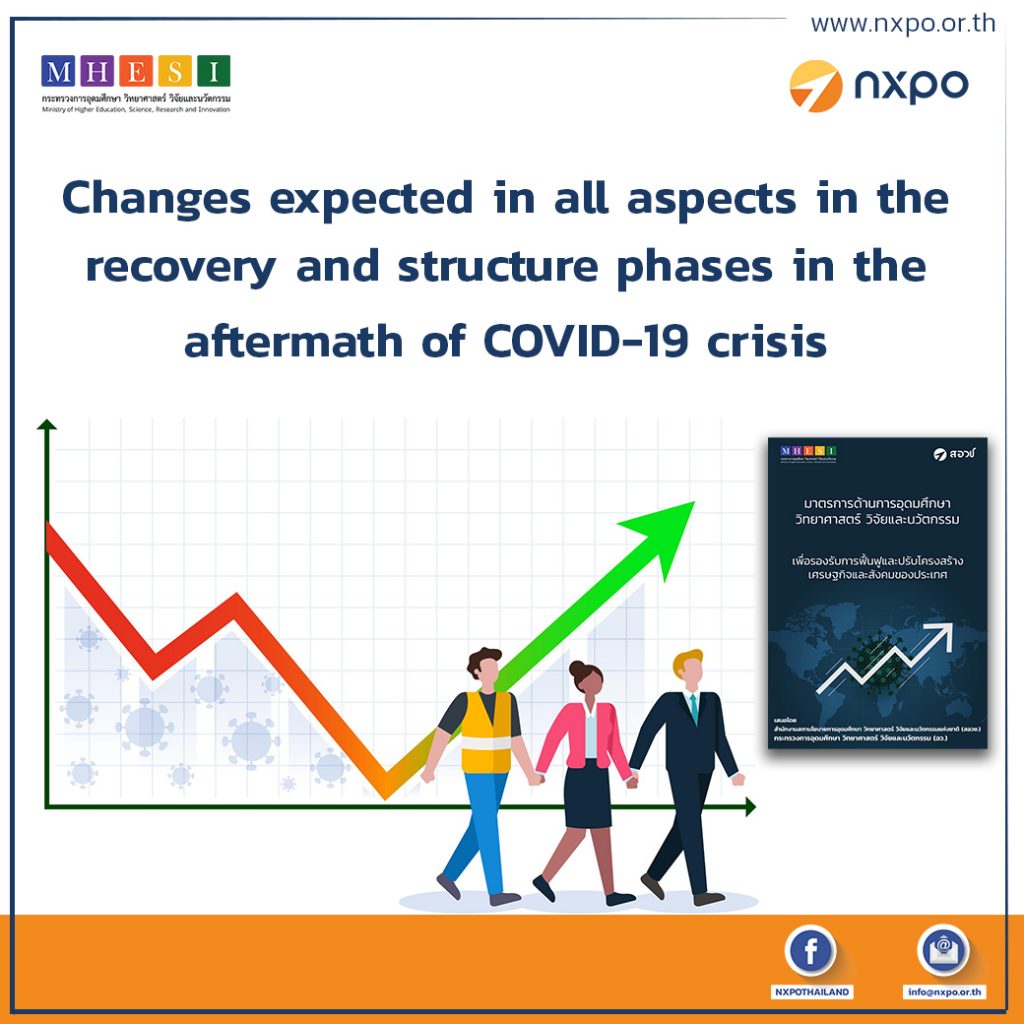
According to the recently released study report on higher education, science, research and innovation measures for economic and social rehabilitation and reform, changes are expected in all aspects during the recovery phase and restructure phase.
Changes in the recovery phase can be summarized as follows:
- Economy. Inbound tourists are expected to return, though far less from before the pandemic. Despite the reopening, businesses are cautious with their investment and continue to cut costs. Reopening of borders jumps start the export and boosts the agri-food industry Thailand is known for. For retail businesses, an online market has become the new normal. Companies start to realize the value of work from home and tend to maintain this policy even with the restart of businesses. The government has rolled out mega projects to create jobs in response to the high unemployment rate caused by the pandemic.
- Society. People start to reevaluate their lives. Some have returned to their hometown; others opt to pursue new jobs of their passions. More attention is being paid to environmental and personal care issues. The government places high priority on solving social inequality and begins to empower the local administration which will result in more community innovations.
- Health. Protective measures, e.g frequent hand wash, mask wearing and healthy eating, have become social norms. Hospitals now have measures in place for dealing with emerging and reemerging diseases. Medical device industry witnesses a big boost by the pandemic. Tele-medicine has been commonly employed, and healthcare technologies have become more accessible in rural areas. Increase in health research investment has been seen in both public and private sectors.
- Education. Schools reopen with protective measures put in place. The blend of online and offline classes will give rise to education startups. Universities will offer more courses and programs to equip students with professional skills, whereas students are drawn to new disciplines. Students and newly graduates will engage more with the local communities, resulting in the creation of local startups and social enterprises.
The restructure phase will involve the introduction of systems reform to accommodate social new normal in various aspects as follows.
- Economy. Countries around the world will strive for self-reliance and therefore global supply chains will be increasingly replaced by regional supply chains. There will be an increase in mixed-use property development to enable the co-existence of working and living space. The growth in high quality tourisms such as wellness tourism and secondary city tourism is expected. Advanced technology such as virtual reality (VR) and augmented reality (AR) will be exploited in the travel industry. Businesses will increasingly adopt lean and agile organization management cultures. The birth of novel innovations to support work from home is expected.
- Job market. A big increase in freelancers is expected and the government will design an employment security system for this type of workforce. People will spend less on luxury goods and focus their spending on products and services that improve their quality of life. Local economy will be expanded due to an increase in community development projects such as infrastructure development and promotion of local tourism.
- Society. People will pay more attention to finance, ICT and health. Trust will become an essential element in the society. Government jobs will be in high demand due to job security they are able to provide.
- Health. Once the COVID-19 vaccine is available, people will have access to vaccine. Health system will be further developed to systematically address emerging diseases. With increasing attention to health, wearable devices such as smart watches and activity trackers will gain popularity. Non-communicable disease rate is expected to go down. Medicine will be moving away from treatment to prevention. Health startups will be on the rise.
- Education. Universities will be more competitive and reduced in size, with clear segmentation. Blended education of online and offline classes, skill-focused program and lifelong learning will become more common.







